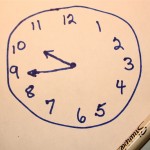
Recently, the one millionth person in England became a dementia friend. Now this shows how much awareness of dementia has been raised already since the initiative started two years ago, and is continuing to make everyone aware, from shop owners to hotels to friends.
In the English National Dementia Strategy, and in the new Prime Minister’s Challenge on Dementia 2020 (PDF), raising awareness is one major priority. Another one is improving diagnosis rates. With high GP workloads and a large assessment involved when diagnosing dementia, finding ways to increase the number of diagnosed people with dementia and reducing the time of diagnosis are much sought-after.
In this blog, I review a recent Cochrane systematic review on the efficacy of the Mini-Cog (Borson et al., 2005) in detecting dementia by Fage and colleagues (2014).

The Mini-Cog test involves remembering 3 words and repeating them 3 minutes later, and drawing a clock-face with a specific time on it.
Methods
The authors (Fage et al., 2014) searched standard electronic databases, including MEDLINE and PsycINFO, whilst also looking through the reference lists of each relevant study for more studies. Studies were included if they used the Mini-Cog (PDF) as a cognitive diagnostic tool; included people with dementia in a community setting; and clearly explained how a diagnosis of dementia was made.
The authors scanned 110 studies after having removed duplicates, and excluded 107 studies based on their exclusion criteria.
Results
- The three included studies were all conducted by the creators of the Mini-Cog.
- In all studies, people were recruited from community samples.
- Two of the three studies interestingly excluded people with mild cognitive impairment, in many cases the stage before dementia, or people with possible dementia.
- The specificity and sensitivity of the Mini-Cog was found to be high, but subject to possible bias in the participant selection.

The review did not find sufficient evidence to recommend the Mini-Cog as a cognitive screening test in community settings.
Strengths and limitations
This review follows standard guidelines of conducting a systematic review, in searching a broad range of databases for studies, as well as hand searches. This is linked with appropriate extraction methods. Considering the small number of studies resulting from the searches (only three inclusions), it may have been more appropriate for the authors to go back to the first searches and redo the searches for any setting.
Currently, this review only focuses on community settings. Whilst Chan et al. (2014) and Seitz et al. (2014) are in the process of redoing this systematic review for primary and secondary care settings, it may have been truly more appropriate to apply any setting. We shall see how many studies are turned up by the primary and secondary care reviews.
The other limitation of this review is not subject to the review itself, but to the limitations of the included studies. As the authors rightly highlight, two study samples had very high prevalences of dementia (44% and 52%). These high proportions are not common in the general community-dwelling older population, which means that participants were preselected. This could have biased the reported sensitivity and specificity of the Mini-Cog.

The three Cochrane reviews on the Mini-Cog (1 published and 2 in progress) may have worked better as one big review.
Summary
The Mini-Cog does not seem to be an effective alternative to currently-practised forms of dementia diagnosis. There is too little evidence available, and the evidence there is has only been produced by the creators of the Mini-Cog.
Comparing the Mini-Cog to other brief measures of global cognition, such as the Mini-Mental State Examination (MMSE), the Montreal Cognitive Assessment (MoCA) and the Addenbrooke’s Cognitive Examination III (ACE-III), the Mini-Cog appears too brief to be truly reliable in assessing dementia. The MMSE, MoCA and the ACE-III comprise a variety of different forms of cognition, for example asking people to repeat a sentence, to calculate, to write a couple of sentences or to remember an address after a ten-minute delay. Still, they only last between 10 to 15 minutes to administer each.
Although the efficacy of the Mini-Cog is currently being reviewed in primary and secondary care settings by the Cochrane Dementia and Cognitive Improvement Group (Chan et al., 2014; Seitz et al., 2014), it is unlikely that the Mini-Cog will replace current cognitive screening tools.
Indeed, if we are to address the government’s objective to improve dementia diagnosis, we must better understand the earliest symptoms of daily activity problems (Giebel, Challis, & Montaldi, 2014), or indeed (on a micro-level) detect the build-up of amyloid-beta oligomers in the brain earlier (Rushworth et al., 2014).

All of the included studies were conducted by the creators of the Mini-Cog, which is not ideal.
Links
Fage BA, Chan CCH, Gill SS, Noel-Storr AH, Herrmann N, Smailagic N, Nikolaou V, Seitz DP. Mini-Cog for the diagnosis of Alzheimer’s disease dementia and other dementias within a community setting. Cochrane Database of Systematic Reviews 2015, Issue 2. Art. No.: CD010860. DOI: 10.1002/14651858.CD010860.pub2.
Borson, S., Scanlan, J., Watanabe, J., et al. (2005). Simplifying detection of cognitive impairment: comparison of the Mini-Cog and Mini-Mental State Examination in a multiethnic sample. Journal of the American Geriatrics Society, 53, 871-874. [PubMed abstract]
Chan CCH, Fage BA, Smailagic N, Gill SS, Herrmann N, Nikolaou V, Seitz DP. Mini-Cog for the diagnosis of Alzheimer’s disease dementia and other dementias within a secondary care setting (Protocol). Cochrane Database of Systematic Reviews 2014, Issue 12. Art. No.: CD011414. DOI: 10.1002/14651858.CD011414.
Giebel, C.M., Challis, D., & Montaldi, D. (2014). A revised Interview for Deteriorations in Daily Living Activites in Dementia reveals the relationship between social activities and well-being. Dementia, doi: 10.1177/1471301214553614 [PubMed abstract]
Rushworth, J., Ahmed, A., Griffiths, H., Pollock, N., Hooper, N. & Millner, P (2014). A label-free electrical impedimetric biosensor for the specific detection of Alzheimer’s amyloid-beta oligomers. Biosens Bioelectron, 56, 83-90. [Abstract]
Seitz DP, Fage BA, Chan CCH, Gill SS, Herrmann N, Smailagic N, Nikolaou V. Mini-Cog for the diagnosis of Alzheimer’s disease dementia and other dementias within a primary care setting (Protocol). Cochrane Database of Systematic Reviews 2014, Issue 12. Art. No.: CD011415. DOI: 10.1002/14651858.CD011415.

RT @Mental_Elf: Mini-Cog for dementia diagnosis in the community http://t.co/I9zEb2ocA6
@Mental_Elf improving diagnosis means better accuracy not speed. Only full npsych eval & ct/mri imaging do that
Mini-Cog for dementia diagnosis in the community: Clarissa Giebel writes her debut Mental Elf blog about a rec… http://t.co/8FUnrrPuQM
Raluca Lucacel liked this on Facebook.
#ActuSanté – Mini-Cog for #dementia #diagnosis in the community http://t.co/jpbQpuKuQF By @ClarissaGiebel via @Mental_Elf
My 1st @Mental_Elf blog on the Mini-Cog for #dementia diagnosis http://t.co/UFd4x62ScN #demphd @juliechristie1 @trynrose @Musica_Rosie
My 1st @Mental_Elf blog on the Mini-Cog for #dementia diagnosis http://t.co/UFd4x62ScN #carers @AnitaDavies1 @nicholaverstra1 @PSSRU_LSE
New @Mental_Elf blog by #PSSRU @ClarissaGiebel on the Mini-Cog for dementia diagnosis: http://t.co/XFkKWWSGmu #mhchat @SNMSWResearch @MHchat
Today @ClarissaGiebel on #CochraneEvidence for Mini-Cog to diagnosis #dementia in the community http://t.co/I9zEb26BIy
Mosaic Training Consultancy Ltd liked this on Facebook.
The Mental Elf liked this on Facebook.
New @Cochrane SR of Mini-Cog for diagnosis of Alzheimer’s disease & other dementias in community http://t.co/I9zEb26BIy
Check out the @Mental_Elf blog on community #dementia assessment from our marvellous, multitasking @ClarissaGiebel http://t.co/vAVTnz4c8K
@SocialCareElf @Mental_Elf you are too nice :-)
Thank you for your thoughtful review of the paper
Mental elf reviewed my paper @sanjsockalingam @jllaidlaw Mini-Cog for dementia diagnosis http://t.co/hJIlCE1oDO via @sharethis
RT @Millsy_Rose: Congrats @FageMD for the @Mental_Elf review of your review! http://t.co/H9TNtWgcDU
RT @Mental_Elf: .@Cochrane find insufficient evidence to recommend Mini-Cog as a cognitive screening test in community http://t.co/I9zEb26B…
Doaa Riad Ayoub liked this on Facebook.
RT @pash22: Mini-Cog is not effective alternativ to currently practised forms of dementia diagnosis http://t.co/29P3Rag7tv via @Mental_Elf …
RT @Mental_Elf: Don’t miss: Mini-Cog for dementia diagnosis in the community http://t.co/I9zEb26BIy #EBP
Mini-Cog for #dementia #diagnosis in the community http://t.co/ABHMUGEn00 @Mental_Elf reviews the #evidence
Mini-Cog for dementia diagnosis in the community http://t.co/9jRVfyeSYA via @sharethis
Mini-Cog for dementia diagnosis in the community via @DocMartin68 http://t.co/nq6ew2lSW8
MT @DrHubaEvaluator: Mini-Cog NOT for dementia diagnosis in the community via @DocMartin68 http://t.co/MWIqCDOwwa
Mini-Cog for dementia diagnosis in the community http://t.co/4q6tgBnD9Y – Hm, Interesting. #Research
Mini-Cog does not an effective alternative to currently-practised forms of dementia diagnosis via @paulash22 http://t.co/BPKbYVG13l
[…] You can read the Mental Elf piece here. […]
[…] few weeks ago, I wrote a Mental Elf blog about a Cochrane Systematic Review looking at how effective the Mini-Cog is to diagnose dementia […]